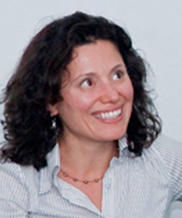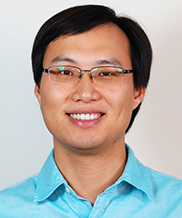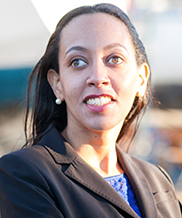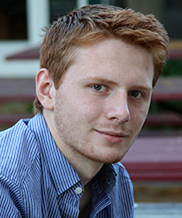Augmenting Abilities
mediaX Post-Doctoral Scholar Karina Alexanyan will moderate a panel on the potential for technology to augment communication and empower individuals with diverse physical and neurological abilities. White House Champion of Change, Haben Girma, will discuss designing for universal access. Cong Chen will reveal insights from Fujitsu’s development of interactive toys for behavior assessment, and Catalin Voss, co-founder of the Stanford Autism Glass Project, will demonstrate his innovative wearable technology.
 Karina Alexanyan, Moderator: Augmenting Abilities. Karina is a Postdoctoral Scholar and Project Manager at mediaX at Stanford University. Dr. Alexanyan’s research background is in global social media networks, technology, and education. She has consulted for leading academic, corporate and non-profit clients, including Stanford, Harvard and Columbia Universities. Alexanyan holds a PhD in Communications from Columbia University, a M.A. in Communication from NYU and a BA in Linguistics and Modern Languages from the Claremont Colleges.
Karina Alexanyan, Moderator: Augmenting Abilities. Karina is a Postdoctoral Scholar and Project Manager at mediaX at Stanford University. Dr. Alexanyan’s research background is in global social media networks, technology, and education. She has consulted for leading academic, corporate and non-profit clients, including Stanford, Harvard and Columbia Universities. Alexanyan holds a PhD in Communications from Columbia University, a M.A. in Communication from NYU and a BA in Linguistics and Modern Languages from the Claremont Colleges.
 Cong Chen, Smart Toys for Behavior Assessment and Intervention. Guided Play is a technology developed by Fujitsu Laboratories of America that uses instrumented games or toys as sensors to assess early behavioral markers of Autism Spectrum Disorder and facilitate behavior intervention during play. This presentation will describe the Guided Play system, including the design and implementation of a prototype on iPad and initial evaluations and insights. This technology can be applied to tangible objects such as smart toys for a natural human-computer interface.
Cong Chen, Smart Toys for Behavior Assessment and Intervention. Guided Play is a technology developed by Fujitsu Laboratories of America that uses instrumented games or toys as sensors to assess early behavioral markers of Autism Spectrum Disorder and facilitate behavior intervention during play. This presentation will describe the Guided Play system, including the design and implementation of a prototype on iPad and initial evaluations and insights. This technology can be applied to tangible objects such as smart toys for a natural human-computer interface.
Dr. Cong Chen is a member of research staff at Fujitsu Laboratories of America (FLA). His research interests include intelligent human-computer interaction, information retrieval, and information visualization. At FLA, he has created Guided Play, a technology that aims to evaluate and improve children’s play behavior, especially for those with autism. Cong holds a PhD in computer science from The University of Texas at Dallas.
 Haben Girma, Designing for Universal Access. Technology has the potential to facilitate the creation of communities and increase opportunities for education, employment, and self-growth. Designing with universal access inmind will ensure that people with disabilities can also harness the opportunities offered through technology.
Haben Girma, Designing for Universal Access. Technology has the potential to facilitate the creation of communities and increase opportunities for education, employment, and self-growth. Designing with universal access inmind will ensure that people with disabilities can also harness the opportunities offered through technology.
White House Champion of Change, Forbes 30 under 30 leader, and BBC Women of Africa Hero, Haben Girma is a civil rights advocate. The first Deafblind person to graduate from Harvard Law School, Haben works as an advocate for equal access to information for people with disabilities, earning her recognition from President Barack Obama and President Bill Clinton. Haben helped increase access to a library of digital books for blind readers in a 2014 landmark case. A celebrated speaker, Haben had the honor of introducing President Barack Obama and Vice President Joe Biden at the White House Celebration of the 25th Anniversary of the Americans with Disabilities Act. Her TEDx Talk, highlighting her pioneering work, continues to inspire people to strive for a more inclusive society.
 Catalin Voss, Wearable Technology to Augment Expression Recognition. Over 1 million children under the age of 17 in the US are on the autism spectrum. These children often times fail to recognize basic facial emotions, which makes social interactions and developing friendships even more difficult to sustain. Gaining these skills requires intensive behavioral interventions that are often expensive, difficult to access, and inconsistently administered. Our team at Stanford has developed a system using machine learning and artificial intelligence to automate facial expression recognition that runs on wearable glasses and delivers real-time social cues. Our technology uses the outward-facing camera on the glasses to read facial expressions and provides social cues within the child’s natural environment and provides information for behavioral intervention.
Catalin Voss, Wearable Technology to Augment Expression Recognition. Over 1 million children under the age of 17 in the US are on the autism spectrum. These children often times fail to recognize basic facial emotions, which makes social interactions and developing friendships even more difficult to sustain. Gaining these skills requires intensive behavioral interventions that are often expensive, difficult to access, and inconsistently administered. Our team at Stanford has developed a system using machine learning and artificial intelligence to automate facial expression recognition that runs on wearable glasses and delivers real-time social cues. Our technology uses the outward-facing camera on the glasses to read facial expressions and provides social cues within the child’s natural environment and provides information for behavioral intervention.
Catalin Voss is a student entrepreneur at Stanford University. He is the founder of the Stanford Autism Glass Project and computer vision company Sension, which was acquired by GAIA Systems in 2015. Prior to coming to Stanford, Voss built a mobile payments system at PayNearMe while still in high school. He has been recognized with several awards for his work in industry and as an entrepreneur, including the Lemelson-MIT prize, Forbes’ 30 under 30, Business Insider’s 40 under 40, and several profiles (Spiegel, WSJ, WIRED, NBC). Voss is also a Venture Partner at Axel Springer, Europe’s largest publishing company.